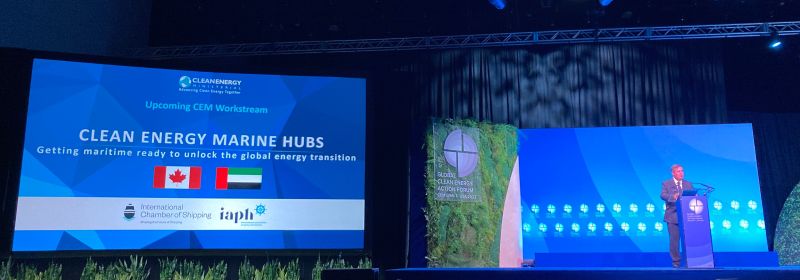Maritime ammonia to link UAE, Canada
By Julian Atchison on October 06, 2022

The governments of Canada, Norway, Panama, the UAE and Uruguay will be participants in a new private-public partnership aiming to de-risk investment in alternative maritime fuels. The Clean Energy Marine Hubs (CEMH) platform was launched at the 13th annual Clean Energy Ministerial, with the International Chamber of Shipping (ICS) and International Association of Ports & Harbors (IAPH) supporting the announcement.
The CEMH platform aims to bring together players across the entire maritime fuel value chain to accelerate the deployment of alternative fuels like ammonia, and almost mimics the green maritime corridor concept by establishing guaranteed fuel availability at key points on international shipping routes. At the launch, government representatives from Canada and the UAE announced the first CEMH collaboration:
Currently, the expansion of the UAE’s hydrogen economy is in process with mega projects involving several of our leading ports. The two-gigawatt green ammonia project by Taqa, the Abu Dhabi National Energy Company, and Abu Dhabi Ports is one such project that will produce green hydrogen and process it into liquid ammonia, to be used in ships as bunker fuel and for export. This coupled with other endeavours by our ports will reinforce the UAE’s position as a key competitive maritime hub…we are looking forward to our collaboration with all international governments, such as Canada, to reinforce the adoption of hydrogen technologies and fuels.
Director of Future Energy Department, UAE Ministry of Energy and Infrastructure Nawal AlHanaee in the Clean Energy Ministerial’s official press release, 23 Sept 2022
Hydrogen strategy under-development for the UAE
The Ministry of Energy and Infrastructure, GHD Group, and German research institute Fraunhofer-Gesellschaft will develop a national hydrogen strategy for the UAE. In the announcement, Minister of Energy and Infrastructure Suhail bin Mohammed Al Mazrouei confirmed that the UAE was still focused on a target of supplying 25% of clean hydrogen imports to Germany by 2030 (we first reported on this ambition in March), and that the new strategy would map out a pathway forward for a society wide hydrogen economy in the Gulf state.